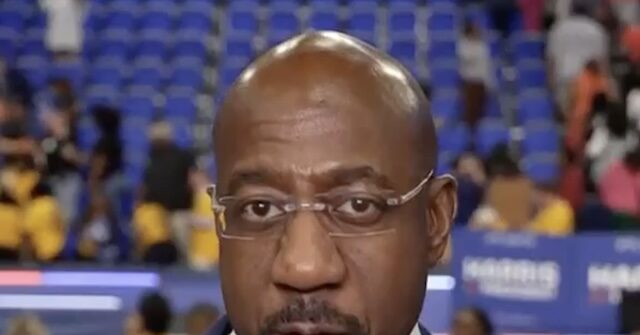In a recent interview on NBC’s “Meet the Press,” Senator Raphael Warnock (D-GA) articulated the sentiment among voters leading up to the upcoming election, emphasizing that it is a “change election” where the public is eager to “turn the page.” According to a poll, a notable 66% of voters feel that the country is on the wrong track. This statistic raises concerns about the electoral prospects of the incumbent party, as history suggests that such overwhelming discontent typically hampers re-election efforts. When prompted by host Kristen Welker on whether Vice President Kamala Harris should have distanced herself more from President Biden, Warnock maintained that voters are clamoring for progress, not regression, underscoring the stark contrast between the current administration’s forward-looking agenda and former President Donald Trump’s desire to revert to the past.
Welker highlighted the narrowness of Harris’s lead over Trump regarding the “change” sentiment, a point that warrants consideration, especially when assessing Harris’s public image and campaign strategy. During his own re-election efforts, Warnock carefully balanced his relationship with President Biden, managing to maintain success while keeping some distance. He was asked if Harris should adopt a similar approach. Warnock’s response focused on the importance of connecting with the constituents and reflecting their needs rather than engaging in self-centered political maneuvering. He pointed out that Harris, like himself, is dedicated to prioritizing the interests of the people she represents, while he classified Trump’s campaign as primarily self-serving.
Throughout the discussion, Warnock underscored the notion of hope embodied in Kamala Harris’s campaign. He articulated that she represents the future and reflects the aspirations of an America that continuously looks forward rather than backward. He criticized the stagnant perspective associated with older political figures, signaling that the younger generation is ready for a more progressive approach to governance. Warnock’s framing of the election as a decisive choice between moving forward with new progress versus reverting to previous norms reveals his strategic positioning regarding Biden’s administration and its vision against that of Trump’s.
The contextual backdrop of the interview highlights the broader societal concerns surrounding the current political landscape. The prevailing dissatisfaction among voters signifies a shift in the electorate’s priorities and demands, suggesting that candidates must align their messages with the populace’s desire for change. Warnock’s statements reflect a keen awareness of these dynamics, positioning Harris as a vessel for the hopeful future many voters crave. This aligns with his broader political strategy of presenting himself as relatable and attuned to the challenges faced by everyday citizens, thus fostering a sense of connection between him, Harris, and the electorate.
As the political climate intensifies, Warnock’s emphasis on the need for renewal within the party stands as a crucial element in shaping the Democratic strategy for the upcoming elections. There is an evident urgency among Democrats to rally their base and attract undecided voters by showcasing a unified front that prioritizes innovative and inclusive policies. By asserting the need for a new direction, both Warnock and Harris are marrying their campaigns to the collective desire of the constituents for tangible change and progress.
In conclusion, Senator Warnock’s interview is not only a reflection of current electoral challenges but also an insightful commentary on the shifting sentiments among voters. His clarification on the significance of focusing on the population’s needs rather than self-serving political ambitions emphasizes a landscape where collaboration and forward-thinking ideals must prevail. By positioning Kamala Harris as a progressive beacon for the future, he aims to galvanize support for the Democratic platform, underscoring the party’s commitment to addressing the issues that concern Americans most. As the election approaches, Warnock’s insights may prove pivotal in steering the narrative toward an optimistic vision for America’s political future.

